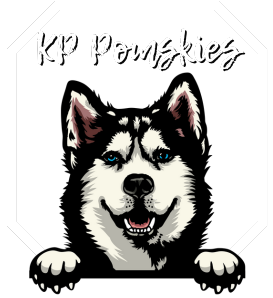Are Pomskies Healthy?
Let’s face it, all well-bred dogs have hefty price tags. Pomskies are very similar in cost to most other well-bred dogs on the market. (they are about middle of the scale) As such, people want to know that their future Pomsky will be healthy.
There are rumors because Pomskies are a crossbreed, naysayers stating that “Pomskies are full of health issues” - so let’s explore this.
What genetic issues are common with Pomskies?
We have a database of every breeding dog by the 200+ Pomsky breeders that are on the online community of breeders (this does not account for commercial puppy farms that supply pet stores, puppy mills, and the Amish community as they do not DNA test), as they have to submit this to post on the approved Facebook groups. As such, we are able to take a broad view of the genetic health panels of Pomskies across the board.
IMPORTANT! Most diseases require 2 copies of the genetic trait to put them at risk for the disease. If the dog has 1 copy of the genetic marker, it does not affect them and does not affect their offspring. This is easily avoidable by not pairing 2 recessive gene carriers together for breeding, which is also why DNA testing is so vital with the breed. The online community of breeders, specifically those associated with the APKC kennel club, are meticulous about this.
DEGENERATIVE MYELOPATHY (DM) is a spinal condition. It is a recessive gene in approximately 20-30% of the breeding population. The other thing that’s of interest is that there is not a singular known case of DM within the Pomsky community to date. There are many breeds that are not affected by the disease, even if they have 2 copies of the genetic marker, and we are currently exploring if this is also the case with Pomskies.
VON WILLEBRAND TYPE 1 (VMD1) is a blood clotting condition. It is a recessive gene in approximately 5% of the breeding population. We have not had reports of a known case of a Pomsky with this disorder and causing medical issues to date.
CANINE MULTIFOCAL RETINOPATHY 1 (CMR1) is an eye disorder that can cause blindness. This is a recessive gene in approximately 10-15% of the breeding population.
The above are the main 3 diseases that we have seen in the population. Embark DNA tests for 200+ genetic disease markers, but only 11 or so are relevant for the combination of Siberian Husky, Pomeranian, and American Eskimo.
Science is ever-evolving. DNA testing for dogs really became established around 2015, just shortly after Pomskies began to be bred.
There are still conditions that are being discovered, and some conditions that are not genetic and are environmentally controlled.
Environmentally exacerbated, such as seizures and allergies, and some joint issues if dogs are on slick floors, such as patellas/hips. Overexcising the puppy too young also hurts joints.
Food-based, such as allergies and dental issues.
Influenced by the way they are raised by the breeder or during the formative time by the owners (up until 6months), such as separation anxiety, potty training consistency, and behavioral issues.
MORE TESTING TO ENSURE HEALTH:
DNA testing is not enough by itself. All other breeds’ kennel clubs require OFA testing of their breeders. All other breeds. This is the one thing that Pomsky breeders do lack. When I first started OFA testing, it was on the request of my vet, not that it was a push within the Pomsky breeder community. I was one of the very first that began OFA testing my dogs, and I received some negative comments regarding it. There are Pomsky breeders that say that their dogs don’t have issues, and so do not need to do this testing.
Luxating patellas is a major concern within the Pomsky community. Frankly, it is our number #1 issue. As you consider breeders, be sure that they are getting their dogs OFA patellas certified as a minimum standard.
NO DOG IS PERFECT:
I pour my blood, sweat, and tears into my programs. I drop tens of thousands of dollars annually into my dogs and into my program. I spend hundreds of hours exploring genetics, discussing challenges, looking at structure, and volunteering to educate potential buyers and mentoring new breeders.
It hurts my heart if I hear of one of my adult puppies facing issues. I can test my dogs to the top standards of the breed but there’s always a chance that something will happen because no animal is genetically perfect. There are many factors at play, undiscovered genetic diseases, environmentally exacerbated issues, the way they are raised, and much more.
Just as two perfectly healthy human parents can have a child that has a severe disability, the same is always the chance with dogs as well.
So I try to the best of my ability, but I cannot guarantee a perfectly healthy and mentally sound dog because that is out of my hands. I do offer a 2-year genetic warranty that can be viewed on my website. Feel free to reach out with any questions.
